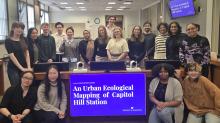UW Sociology is working with Sound Transit to improve a local service that affects our daily lives–the health of our environment and vitality of our local economy rest on the availability of good transportation options.
A research team from UW Sociology, including Dr. Kyle Crowder, Dr. Nathalie Williams, and Dr. Tyler McCormick has spent the 2024–2025 academic year working with Sound Transit to improve Seattle public transportation. Their research focuses on the Link light rail, investigating why people might avoid public transit and how to make informed interventions to make Seattle public transit more safe and usable.
We are especially proud of our undergraduate students who have been a vital part of the research team. In Winter 2025, Dr. Anne Tseng and PhD student Brandon Morande taught SOC 403: Applied Research, a course that introduced undergraduate students to the project. In class, students first developed a theoretical background, learning about research methodologies and sociological work on public transit, social disorder, and crime. Then, they put what they learned in the classroom to immediate practical use–they designed new data collection tools to meet the project’s needs and put their framework into practice.
After developing their data-collection tool, students piloted it by focusing their research on one transit station. Students practiced field work by observing the station, tracking elements like trash and graffiti, the presence of fare enforcers and security personnel, passenger flow through the station, and more. They then analyzed the data they collected in conjunction with available data such as demographics, crime statistics, and proximity of businesses and social services.
At the end of the term, students presented their work to Sound Transit officials at their headquarters in King Street Station, sharing findings and answering questions about their project’s theoretical underpinnings and methodology. They successfully translated their expertise and research rigor, practicing the important skill of communicating research effectively to stakeholders.
By the end of the quarter, students had gained skills in theoretical research, methodology, data collection and analysis, and communication. Their work will contribute to the department, the field of sociology, and the community. Most immediately, they laid a crucial foundation for this ongoing project by developing and piloting their data-collection tool, suggesting improvements for researchers to implement in the next stages of research. Their methods of data collection and recommendations will be vital in the ongoing success of the department’s research with Sound Transit. Their work also contributes to the field more broadly, as future research on public transit could utilize the methods they developed. Finally, their recommendations to Sound Transit will help improve a service that many people rely on for transportation.
We look forward to continuing this mutually beneficial partnership with Sound Transit, and to giving our undergraduate students further opportunities to apply their knowledge in hands-on projects that contribute to our community. We’re especially excited that the students’ hard work contributed not only to the future of Sound Transit, but also their own careers. Three students will continue to work on the project in summer internships with Sound Transit. Our commitment to serving our community through our work only makes our department, and the university, stronger.
